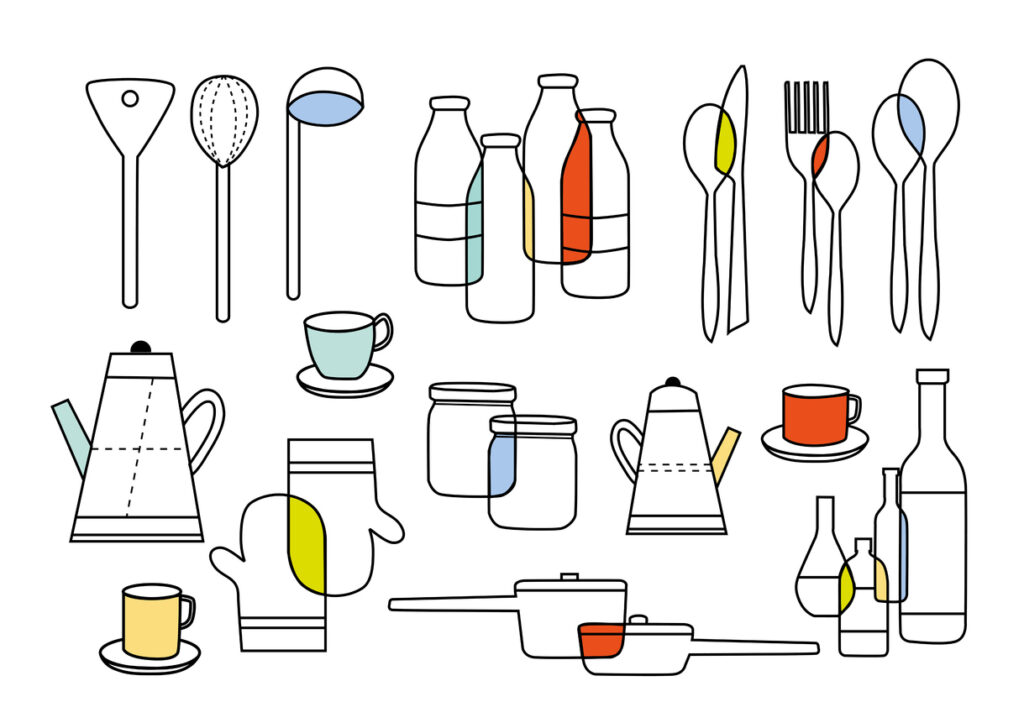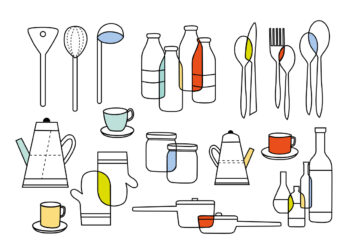Continuing our Kitchen Essentials series of interviews with leaders of infrastructure organizations, today we’re hearing from Sami Benchekroun, CEO of Morressier, a Berlin-based startup that provides publishers with workflows that ensure research integrity.

Please tell us a bit about yourself — your role at Morressier, how you got there, and why you embarked on a career in research infrastructure?
I’m the CEO of Morressier, which I co-founded. I’ve never thought of myself as having a “career in research infrastructure”!
When we started Morressier, we were very aware that other industries – such as banking, music, and enterprise software – were undergoing transformations in which connectivity, data, and scale were bringing radical change, better experiences for users, and opening up new business models. We set out to help the scholarly communications industry in their own transformation.
One of the first things that struck us was the scientific poster: we were astonished at the total lack of infrastructure for all the outputs of science that are not a journal article, despite the enormous value they can hold. As we got to know the industry better, we realized that the entire infrastructure for manuscript submissions itself stems from 90s software – which is largely still true, by the way.
We were convinced that there is a need for enterprise software that would cover all the needs of different content types, while solving the challenges of scale, research integrity, and, most importantly, usability and making workflows a joy to use. We are creating a new foundation for this ever-changing industry — a foundation that will finally enable the industry to reinvent itself.
What do you like most and least about working in research infrastructure?
Research infrastructure is the ‘glue’ that binds together lots of stakeholders across the research community. Morressier workflows are built for scientists, editors, scientific organizations and other parts of the ecosystem – not to mention helping societies, publishers, funders and corporates to grow their businesses. We see immediate impact working in this nexus position.
Because research infrastructure is such a crucial piece to all our partners and to the broader industry, it can sometimes feel so slow to change. Additionally, we are faced with consensus-driven structures that are rather confused, overly bureaucratic, and, without the immediate urge to accelerate!
And yet, the need for change in our industry has never been so urgent. The research integrity crisis, Open Access and the new challenges of scale, and the politicization of science are just a few of the interconnected forces that demand innovation and transformation.
Based on your own experiences, what advice would you give someone starting, or thinking of starting, a career in research infrastructure?
First advice: Think twice 😉
Once ready to embark on the journey, one needs to be ready to embrace seemingly illogical dynamics, archaic structures, a multitude of stakeholders, a global and very diverse ecosystem, “it has always been that way” rhetoric and more. But working in an ecosystem that sets the foundations for every advancement in life sciences, ecology, technology, etc. is one of the most rewarding feelings.
Hence: Build a broad understanding of the entire research landscape, from funders to researchers, and all stakeholders in between. Understanding the various motivations and constraints of stakeholders will help you to navigate through this ocean of complexity.
I would also advise becoming comfortable with taking measured risks: we need to think and behave transformatively in this industry if we are to succeed! The world relies on us to succeed.
What sort of infrastructure does Morressier provide, and who are your users?
Our bread and butter is workflows. When we started out, we built a series of discrete products around different problems we identified, such as managing an event, or our early digital poster product. We’ve now understood, however, that all of these products are workflows and we’re building a single, unified ‘publishing engine’ for science that provides modular and configurable workflows for any type of peer-reviewed content.
Whether it’s an abstract, conference proceeding, journal article, book, case study, or a review, our engine enables the flexible use of both standardized and configurable processes for peer review in a streamlined workflow. Tools and checks designed to maximize the integrity of scientific content – from author verification to checks for generative AI – are integrated into our workflows.
We also make research integrity checks available in a standalone workflow. This enables clients to efficiently check papers at scale without the need to partner with many different integrity vendors in parallel, uploading documents to multiple systems. We lead the market in aggregating these integrity checks, and we also develop some of our own. The majority of our clients currently are societies, publishers, and their sister organizations, who serve authors, editors, and reviewers. As part of our growth plan we aim to be industry leaders in manuscript and research integrity workflows.
How is Morressier sustained financially?
We generate revenue by selling access to our workflows and are by now a fast-growing business. We also have the strong support of a number of investors, including venture capitalists and well-known Angel Investors in the industry, including: Jan Reichelt, Annette Thomas, Jan Maier, and Thomas Jørgensen. We just announced our Series B investment which was led by Molten Ventures and with the participation of existing investors including Redalpine, Owl Ventures, and Cherry Ventures. This growth investment follows the company’s Series A round communicated in May 2021, and will be topped up with further funding for acquisition opportunities. This incredible support from the capital markets enables us to rapidly innovate and develop new products that support research integrity. This industry desperately needs private companies that can move fast enough to respond effectively to opportunities and threats, including the integrity crisis.
I’m particularly proud of the commercial partnerships that Morressier has been forging. An example is our partnership with IOP Publishing, which is enabling us to co-innovate complex journal workflows that are of great value to the entire industry.
As the leader of a research infrastructure organization, what do you think are the biggest opportunities we’ve not yet realized as a community — and what’s stopping us?
We need to get much better at strategic sharing and collaboration between stakeholders, as well as standardization. I think an example of where we haven’t yet realized the opportunities as a community is in the sharing of data in a way that enables innovative solutions in a healthy and competitive ecosystem to strengthen research integrity and to stay one step ahead of nefarious actors. I’d love to see the STM Integrity Hub taking on the challenge of building such a data lake for the benefit of the community and commercial technology players to compete for the best solutions and to fight against bad actors together.
I think many stakeholders are guilty of solving problems in ways that fit their own legacy processes and systems, without enough thought about supporting a healthy and competitive ecosystem that benefits the industry as a whole. The strategic advisory board that Morressier is supporting was established to catalyze deeper cross-industry collaboration and innovation in exactly these areas, with a focus on the mid-sized, not-for-profit stakeholders to scale faster and create lasting impact.
Looking at your own organization, what are you most proud of, and what keeps you awake at night?
I’m most proud of the team that we’ve been able to bring together here at Morressier. We’re a technology company, and we need amazing people if we’re to innovate and live up to our transformative vision. I’m also really proud of the relationships that we have with our commercial partners. We’re in this together, and for the long haul. My firm belief is that this industry needs a very strong independent technology player that innovates in service of the entire industry, a technology player that embraces new technologies in a fast, yet trusted and transparent way, a technology player that the ecosystem can rely on. That’s what we all are striving for at Morressier and that makes me proud
What keeps me awake at night? I genuinely think we’re at a crunch moment in this industry: the combined forces of misconduct, scale, and technology have led us to an integrity crisis that we all need to act upon urgently. Thinking about how to support our clients to act as fast as possible in this environment is what keeps me up at night.
What impact has/does/will AI have on Morressier?
We’ve embraced AI at Morressier. Whether it’s using neural networks to detect fraud in scientific data or new generative tools to debug code, I see it in use every day, and it’s truly exciting. On the flip side, AI-powered scientific fraud poses a huge risk to the scientific record and I think companies like Morressier need to bring everything they have to the table. The future isn’t going to look like the past, and we need to ensure that the basic alignment between stakeholders, incentives, and technology is there as we innovate together.
What changes do you think we’ll see in terms of the overall research infrastructure over the next five to ten years, and how will they impact the kinds of roles you’ll be hiring for at Morressier?
I think we’re going to experience a radical transformation in the sophistication of software services, as we’ve seen in other industries. Editors, authors, and reviewers will begin to demand enterprise-grade experiences and services, and publishers that cannot match this expectation will struggle. We will be much better equipped for scale and automation, and the days of editors managing workflows with spreadsheets will be a thing of the past.
The scholarly publishing community will need to up its game in terms of security and trust, much in the way that the financial sector and online retailers have done. I see Morressier learning a lot from these industries. In terms of hiring, we’re on the lookout for people with experience in enterprise software-as-a-service delivery, security and trust mechanisms, as well as folks from the scholarly comms community who are hungry to change things.
Discussion
2 Thoughts on "Kitchen Essentials: An Interview with Sami Benchekroun of Morressier"
Hi Sami, thank you for sharing these interesting insights, and for the shout-out to the STM Integrity Hub. I couldn’t agree more on the centrality of workflows and the importance of sharing data and insights to protect Research Integrity collaboratively. The Hub already connects many stakeholders in the scholarly ecosystem, including publishers, editorial systems (including ScholarOne, Editorial Manager, and Manuscript Manager), as well as commercial and non-commercial screening tools and services such as PubPeer, Clear Skies, and various databases developed by Guillaume Cabanac and colleagues. A commonly available ‘data lake’ is certainly a tantalizing idea, but in our experience also very challenging to realize because of the need to keep submitted manuscripts confidential, secure, and respect researchers’ privacy. We would certainly welcome Morressier integrating with the Hub – the Duplicate Submission detection tool would seem like a great place to start?
Thank you Hylke! We are a robust efficiency workflow and integrate all best in class integrity checks at scale and support the marketplace to be enterprise ready. We are very keen on integrating the duplicate submission detection check into the Morressier Integrity Manager to support the Hubs growth on this front.
In other good news is that we are adding new checks every other week and as you have seen with our latest funding announcement also fully committed to invest the majority of our resources into our Integrity Manager.
What’s missing is a data lake that works as a trusted play and supports with the challenges you mentioned – the hub is predestined to fully focus on that as a membership driven endeavour. This would be a massive support for the entire scholarly industry! We are very keen to also support on that end.

